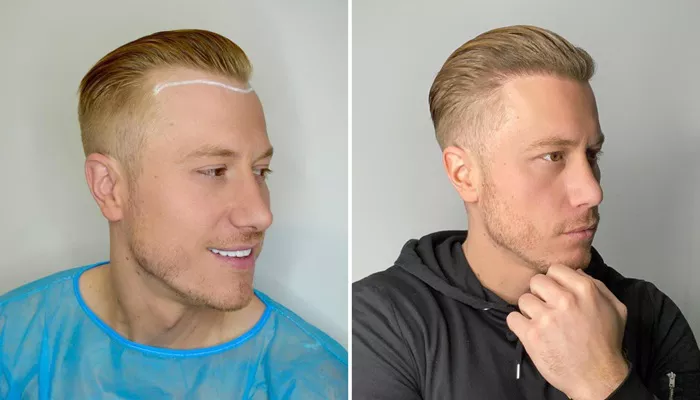Undergoing a hair transplant is a significant decision that requires careful post-operative care to ensure the best possible results. One of the most common questions patients ask is, “When can I start taking vitamins after a hair transplant?” The answer isn’t as straightforward as one might think, as it depends on several factors, including the type of vitamins, the healing process, and the surgeon’s recommendations.
In this article, we’ll explore the ideal timing for resuming vitamin supplements after a hair transplant, the role of vitamins in hair growth, potential risks of taking them too soon, and the best supplements to support recovery and new hair growth.
Understanding the Hair Transplant Healing Process
Before discussing when to reintroduce vitamins into your regimen, it’s essential to understand the stages of healing after a hair transplant. The procedure involves extracting hair follicles from a donor area (usually the back of the scalp) and implanting them into the thinning or balding regions. This process creates tiny wounds that need time to heal.
Immediate Post-Operative Phase (First Few Days)
During the first 48 to 72 hours, the scalp is most vulnerable. Swelling, redness, and minor scabbing are common. The newly implanted grafts are delicate and require proper blood supply to take root. Any disruption—whether from physical trauma, certain medications, or even excessive blood flow from supplements—can affect graft survival.
Early Healing Phase (First Two Weeks)
Over the next two weeks, the scalp begins to heal, and the grafts become more secure. Crusts form and eventually fall off, and the transplanted hairs may shed—a normal part of the process. During this time, the body is working to establish blood flow to the new grafts, and introducing certain vitamins too soon could interfere with this natural healing.
Long-Term Recovery (Months 1-6)
After the initial healing phase, the follicles enter a resting phase before new hair starts growing. This is when nutritional support becomes crucial for optimal hair growth.
Why Vitamins Matter for Hair Transplant Success
Vitamins and minerals play a vital role in hair health, influencing everything from follicle strength to growth rate. Key nutrients include:
- Biotin (Vitamin B7): Strengthens hair and promotes growth.
- Vitamin D: Supports follicle cycling and prevents hair loss.
- Vitamin E: An antioxidant that improves scalp circulation.
- Iron: Prevents anemia-related hair shedding.
- Zinc: Essential for hair tissue repair and growth.
A deficiency in these nutrients can slow recovery and weaken new hair growth, which is why many patients are eager to resume their supplements. However, timing is critical.
When Is It Safe to Start Taking Vitamins After a Hair Transplant?
The general recommendation is to wait at least one week before reintroducing most vitamins. However, this can vary based on the type of supplement and your surgeon’s advice.
The First Week: Proceed with Caution
In the first few days post-surgery, it’s best to avoid any supplements that could increase bleeding risk or interfere with healing. These include:
- Vitamin E: Known to thin the blood, which may increase bleeding around grafts.
- Omega-3 (Fish Oil): Also has mild blood-thinning effects.
- High-dose Vitamin C: While it supports immunity, excessive amounts may interfere with wound healing in some cases.
Your surgeon may advise pausing these for at least 5-7 days.
After the First Week: Gradual Reintroduction
Once the initial healing phase is over, you can slowly reintroduce most vitamins. Key supplements like biotin, vitamin D, and iron are generally safe at this stage and can support recovery. However, always confirm with your doctor before resuming any regimen.
One Month and Beyond: Optimizing Hair Growth
After the first month, the grafts are secure, and the focus shifts to promoting healthy hair growth. This is the ideal time to ensure you’re getting adequate nutrients, either through diet or supplements.
The Best Vitamins to Take After a Hair Transplant
Not all supplements are created equal when it comes to post-transplant care. Here are the most beneficial ones:
Biotin
Biotin is one of the most popular supplements for hair growth. It helps produce keratin, the protein that makes up hair strands. Most patients can safely resume biotin after the first week.
Vitamin D
Low vitamin D levels are linked to hair thinning. Since many people are deficient, supplementing (under medical supervision) can improve follicle health.
Iron
Iron deficiency is a common cause of hair loss, especially in women. If blood tests indicate low levels, iron supplements may be recommended—but only after the initial healing phase.
Zinc
Zinc supports hair tissue repair and prevents shedding. However, excessive zinc can be harmful, so moderation is key.
Multivitamins
A balanced multivitamin can fill nutritional gaps, but check for high doses of vitamin E or other blood-thinning components.
Potential Risks of Taking Vitamins Too Soon
While vitamins are beneficial, taking them too early can pose risks:
- Increased Bleeding: Supplements like vitamin E and fish oil can prolong bleeding, affecting graft stability.
- Inflammation: Some vitamins in high doses may trigger unnecessary inflammation.
- Nutrient Overload: Excessive amounts of certain vitamins (like vitamin A) can actually cause hair loss.
Always follow your surgeon’s personalized advice.
Natural Sources of Hair-Boosting Nutrients
If you’re hesitant about supplements immediately after surgery, focus on nutrient-rich foods:
- Biotin: Eggs, nuts, sweet potatoes.
- Vitamin D: Fatty fish, fortified dairy, sunlight.
- Iron: Red meat, spinach, lentils.
- Zinc: Oysters, pumpkin seeds, chickpeas.
A well-balanced diet can support healing without the risks of premature supplementation.
Conclusion
Resuming vitamins after a hair transplant requires careful timing to avoid complications while maximizing hair growth benefits. While most patients can safely restart supplements after the first week, always consult your surgeon for personalized guidance.
By understanding the healing process and choosing the right nutrients at the right time, you can enhance your results and enjoy a fuller, healthier head of hair in the months ahead.
Related Topics:
- What Thinning Hair Looks Like: A Comprehensive Guide
- Can a Fully Bald Person Get a Hair Transplant?
- Can You Lose Hair After Transplant?


